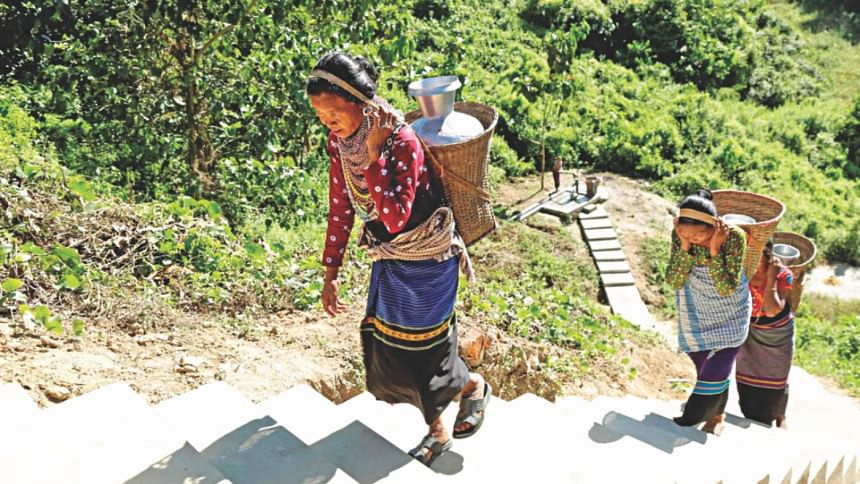ADB-funded projects ensure safe water for hill people

Safe and drinkable water is more than a basic need for humans -- it saves life. But when a community in a remote and hilly area depends only on river for drinking water, life becomes a struggle for survival.
Boli Para, a village under Thanchi upazila of hill district Bandarban, is one such area where people have limited access to everything -- life is very challenging here.
Even till a month ago, the indigenous people of the village, which is about 400 kilometres southeast of the capital, were not getting safe drinking water. Though there were some wells set up by the local government, these did not work throughout the year.
People used to fetch water from the Sangu river, which is also a kilometre away from the village. But those days are gone.
They now have access to water safe for drinking from a natural spring connected through a three-kilometre pipe.
The Chittagong Hill Tracts Rural Development Project (CHTRDP)-2, a project financed by Asian Development Bank, set up two reservoir tanks that reserves water transported from the natural spring through the pipe, which was set up using the gravity flow system. “Prior to this, we were collecting water from the Sangu river. It took almost an hour to come and go from the river,” said Popy Pro Marma, a housewife who lives in the village.
Now that water is available, they can devote more time to other household and income generating activities.
Another villager Promesing Marma said, “The incidence of water-borne diseases, especially diarrhoea, has marked a sharp decline.”
Each reservoir tank has a capacity of 8,000 litres, said Jugesh Chandra Tanchangya, deputy director of the project. A unique feature is that the spring water falls in the reservoirs 24 hours, he added. The project benefits some 500 people of 97 marma families.
The Boli Para is one such sub-project under the CHTRDP-2, which was set up at a total cost of $70.81 million. Of the amount, the ADB is lending $55 million at a low interest rate.
The project is helping to reduce poverty by making social services and economic opportunities more accessible for the rural people, including the indigenous population and poor women, in three hill districts of the Chittagong Hill Tracts -- Bandarban, Khagrachari and Rangamati.
Chimbuk Pabla Headman Para of Bandarban sadar upazila is another sub-project where a 15-metre earthen dam was built to preserve water all year round.
“Earlier, the water coming down from the hill could not be accumulated or used, despite a serious scarcity of water,” said Rudro Murong, a villager.
A 75-metre stair has also been constructed. Beside the dam, a small reservoir has been installed to provide drinking water to the villagers and students at a hostel.
“The stairway is very useful for collecting water from the dam and the reservoir,” said Murong. Earlier, they faced difficulties in collecting the water from the bottom of the hill.
The project also made it easier for the villagers at Tangoziri Para under Lama upazila of Bandarban to access drinking water, by setting up two ring wells.
Earlier, they used to collect water from the streams, springs or dug wells nearby. But these water sources either dry up or become turbid during the rainy season.
“We used to suffer from an acute water crisis and were compelled to drink contaminated water, resulting in diseases and poor health,” said Janati Tripura, a mother of two kids.
But the two ring wells at the bottom of the hill, which were set up two months back, now benefit around 300 indigenous people living there, she added.
A 110-metre stairway has also been constructed to help the villagers collect water from the wells easily.
“Earlier, our women had to climb up and down the muddy and slippery hills to collect water,” said Astani Tripura, the community head.
The farmers in the village also got two power tillers under the project to plough their lands. Previously, they used conventional tools like ploughs and cows to cultivate their lands. But that was slow and time consuming.
“Now we can cultivate more land in less time, grow more food and other crops and have improved our conditions,” said Sri Mohon Tripura, a 45-year-old farmer.
There are maintenance committees comprising local people who look after the establishments and infrastructure set up under the projects.

 For all latest news, follow The Daily Star's Google News channel.
For all latest news, follow The Daily Star's Google News channel. 



Comments